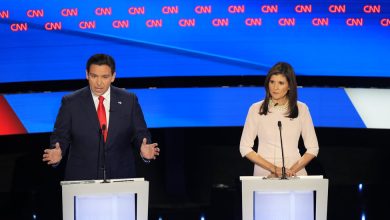The Week in Business: The Twitter Deal

What’s Up? (April 24-30)
Elon Musk to Buy Twitter
Elon Musk reached an agreement on Monday to buy Twitter for about $44 billion, a deal that was unanimously approved by Twitter’s board. The price works out to $54.20 a share, a 38 percent premium over the company’s share price in April, before Mr. Musk revealed he had purchased a 9 percent stake in Twitter. In a matter of weeks, Mr. Musk, the richest person in the world, took his bid from something that investors shrugged off to a serious proposal. The turning point came when he filed documents showing he had the financing to back up his offer. Now, it could be the largest deal to take a company private in at least 20 years, according to data from Dealogic. Still, much remains uncertain as to how the mercurial billionaire will carry out his vision for a platform with less moderation.
Charges of Stock Manipulation
The latest chapter of one of the most high-profile Wall Street investigations in years unfolded on Wednesday, when federal agents arrested Bill Hwang, the owner of the investment firm Archegos Capital Management, and its former chief financial officer, Patrick Halligan, at their homes. The two were charged with racketeering conspiracy, securities fraud and wire fraud, all in connection with a scheme, according to a 59-page indictment, that involved deliberately misleading banks and manipulating stock prices. Initially, they were able to evade scrutiny because of the loose regulations around “family offices” like Archegos — firms that manage investments for the ultrawealthy. But the company imploded last year, and $100 billion in shareholder value vanished almost overnight. Through their lawyers, the men entered not guilty pleas.
Economy Shrinks Yet Remains Resilient
The U.S. economy contracted in the first three months of the year, with the gross domestic product declining 0.4 percent in the first quarter when adjusted for inflation, or 1.4 percent on an annualized basis. The decline had to do largely with slower growth in inventories and a growing trade deficit, as U.S. exports were far outpaced by imports. Absent these, a measure of underlying growth rose 0.6 percent in the first quarter, and the White House preferred to focus on the data without what President Biden called the “technical factors” of inventories and trade. Mr. Biden also pointed to bright spots in the G.D.P. report on Thursday that showed strong consumer spending and continued business investment — signs that the economic recovery is still resilient.
What’s Next? (May 1-7)
A Jobs Report That May Look Familiar
The job numbers for April will be released on Friday, and they are expected to look similar to those from March. Analysts expect a gain of about 385,000 jobs — U.S. employers added 431,000 in March — and an unchanged unemployment rate of 3.6 percent. Last month, some economists suggested that jobs “might be approaching their as-good-as-it-gets moment” and that factors like rapid inflation and higher interest rates could soon slow the labor market. The economy has recovered more than 90 percent of the 22 million jobs lost at the peak of pandemic lockdowns in the spring of 2020, but the Federal Reserve’s interventions and other forces threaten to cut into those gains.
The Fed Weighs a Bigger Rate Increase
A much-anticipated Federal Reserve meeting will take place this week, and Jerome H. Powell, the central bank’s chair, has heavily hinted at what to expect. Last month, Mr. Powell said he thought it was “appropriate” to move more quickly to address rapid inflation and noted that a larger-than-usual increase of half a percentage point would be “on the table” for the May meeting. When the Fed raised interest rates a quarter of a percentage point in March, officials said it would be the first of seven increases this year; now, some are saying that nine may be necessary. These signals from the Fed contributed to a sharp market decline for much of April, with investors worried that higher rates could cut into corporate profits and consumer spending.
OPEC Plus to Weigh In
In March, as oil prices soared and the Biden administration announced a plan to release up to 180 million barrels of oil from a strategic reserve to cushion the impact of Russia’s war on Ukraine, OPEC Plus pushed ahead with a modest increase. The group of countries, which includes Russia, said at the time that it would increase oil output in May by 432,000 barrels a day because it anticipated a “well-balanced market” despite the volatility. OPEC Plus may rethink its wait-and-see approach this week, especially after Germany suggested that it was no longer opposed to an embargo on Russian oil. But some experts say the group is not expected to take any drastic measures.
How Elon Musk Bought Twitter
A blockbuster deal. Elon Musk, the world’s wealthiest man, capped what seemed an improbable attempt by the famously mercurial billionaire to buy Twitter for roughly $44 billion. Here’s how the deal unfolded:
The initial offer. Mr. Musk made an unsolicited bid worth more than $40 billion for the influential social network, saying that he wanted to make Twitter a private company and that he wanted people to be able to speak more freely on the service.
The response. Twitter’s board countered Mr. Musk’s offer with a defense mechanism known as a “poison pill.” This well-worn corporate tactic makes a company less palatable to a potential acquirer by making it more expensive for them to buy shares above a certain threshold.
Securing financing. Though his original offer had scant details and was received skeptically by Wall Street, Mr. Musk moved swiftly to secure commitments worth $46.5 billion to finance his bid, putting pressure on Twitter’s board to take his advances seriously.
Striking a deal. With the financing in place, Twitter’s board met with Mr. Musk to discuss his offer. The two sides soon reached a deal, with the social media company agreeing to sell itself for $54.20 a share.
What’s next? Shareholders will vote on the offer, which will also be reviewed by regulators. The deal is expected to take three to six months to close. In the meantime, scrutiny is likely to be intense and several questions remain about Mr. Musk’s plans for the company.
What Else?
Meta, Facebook’s parent company, reported a 21 percent drop in profits from a year earlier. A union vote is underway at a second Amazon warehouse on Staten Island, and results are expected as early as Monday. President Biden said he would make a final decision on broad student loan forgiveness “in the coming weeks.”





